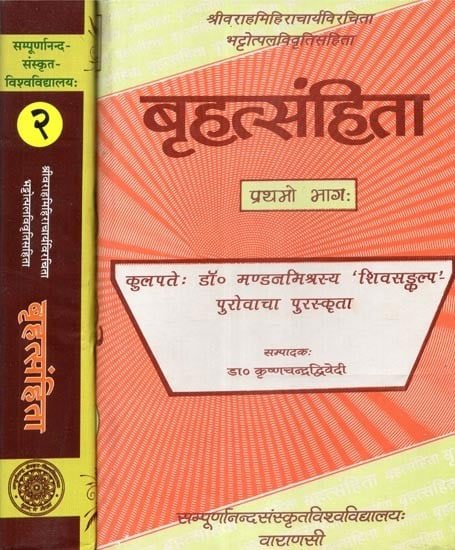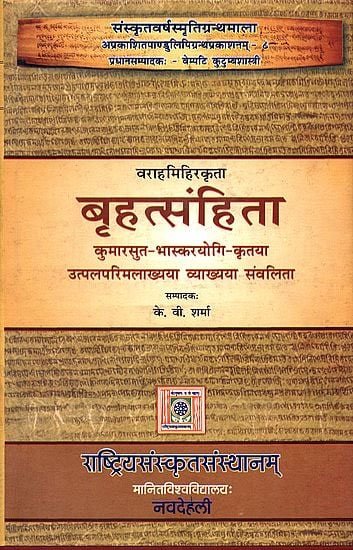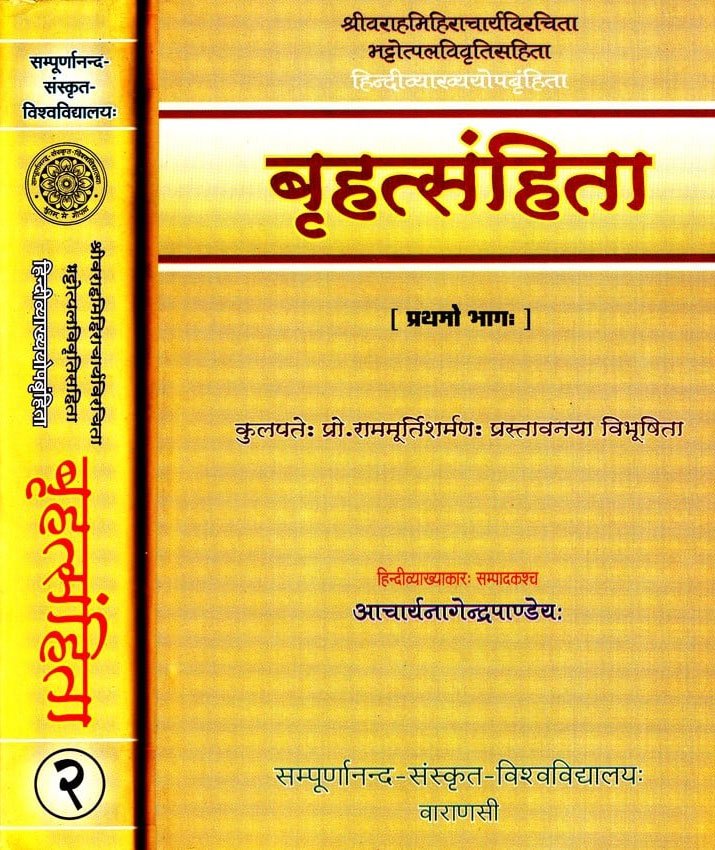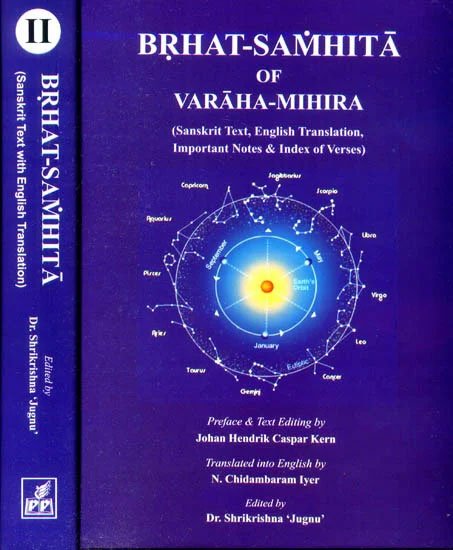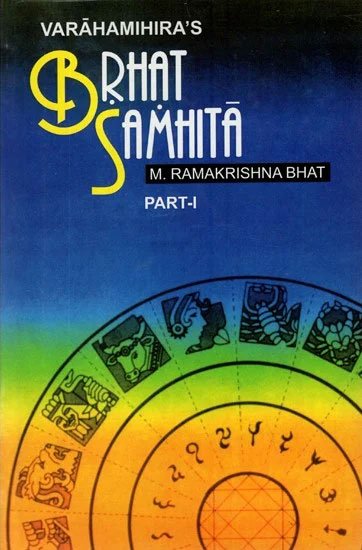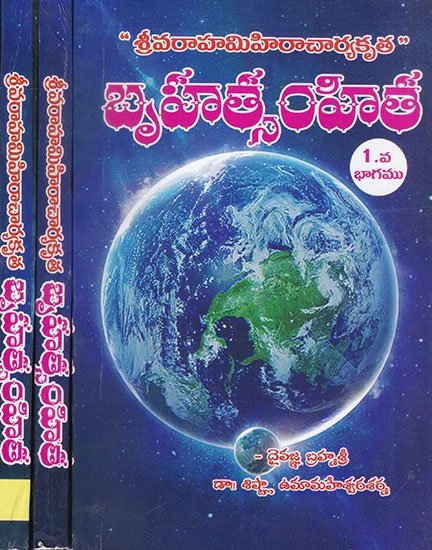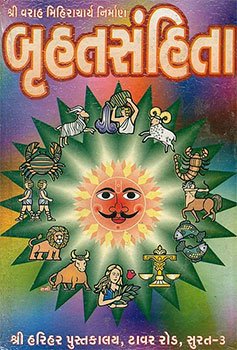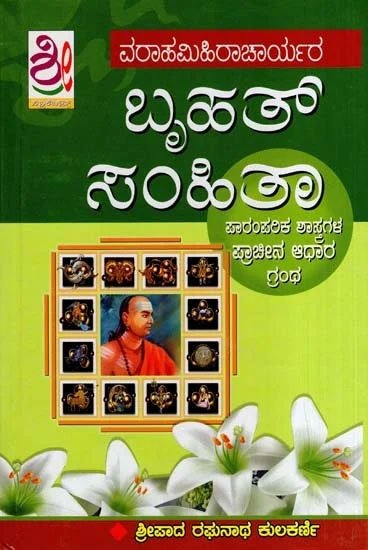Brihat-samhita [sanskrit]
26,560 words
The Sanskrit text of the Brihat-samhita from the 6th-century authored by Varaha Mihira in present-day Ujjain, India. It primarily deals with astrology and astronomy but is presented as an encyclopedia of knowledge.
Verse 5.36
गोपाः पशवोऽथ गोमिनो मनुजा ये च महत्त्वमागताः ।
पीडामुपयान्ति भास्करे ग्रस्ते शीतकरेऽथ वा वृषे ॥ ३६ ॥
gopāḥ paśavo'tha gomino manujā ye ca mahattvamāgatāḥ |
pīḍāmupayānti bhāskare graste śītakare'tha vā vṛṣe || 36 ||
The Sanskrit text of Verse 5.36 is contained in the book Brihata Samhita (Sanskrit Text with Hindi Translation) by Pandit Achyutananda Jha. This book is available online or you could buy the latest edition:
Read online Buy now! The Sanskrit text by Pandit Achyutananda Jha (2001)
Glossary of Sanskrit terms
Note: This extracts Sanskrit terms and links to English definitions from the glossary, based on an experimental segmentation of verse (5.36). Some terms could be superfluous while some might not be mentioned. Click on the word to show English definitions.
Gopa, Pashu, Atha, Gomin, Manuja, Yah, Yat, Mahattva, Agata, Pida, Upaya, Anti, Bhaskara, Bhaskari, Grasta, Grasti, Shitakara, Var, Vrisha, Vrishi,
Analysis of Sanskrit grammar
Note: this is an experimental feature and only shows the first possible analysis of the Sanskrit text (Verse 5.36). If the system was successful in segmenting the sentence, you will see of which words it is made up of, generally consisting of Nouns, Pronouns, Verbs, Participles and Indeclinables. Click on the link to show all possible derivations of the word.
- Line 1: “gopāḥ paśavo'tha gomino manujā ye ca mahattvamāgatāḥ ”
- gopāḥ -
-
gopā (noun, feminine)[nominative plural], [vocative plural], [accusative plural]gopā (noun, masculine)[nominative single], [nominative plural], [vocative single], [vocative plural], [accusative plural]gopa (noun, masculine)[nominative plural], [vocative plural]
- paśavo' -
-
paśu (noun, masculine)[nominative plural], [vocative plural]
- atha -
-
atha (indeclinable)[indeclinable]
- gomino* -
-
gomin (noun, masculine)[nominative plural], [vocative plural], [accusative plural], [ablative single], [genitive single]
- manujā* -
-
manuja (noun, masculine)[nominative plural], [vocative plural]manujā (noun, feminine)[nominative plural], [vocative plural], [accusative plural]
- ye -
-
ya (noun, masculine)[nominative plural]yā (noun, feminine)[nominative dual], [accusative dual]yaḥ (pronoun, masculine)[nominative plural]yat (pronoun, neuter)[nominative dual], [accusative dual]yā (pronoun, feminine)[nominative dual], [accusative dual]
- ca -
-
ca (indeclinable conjunction)[indeclinable conjunction]ca (noun, masculine)[compound], [vocative single]ca (noun, neuter)[compound], [vocative single]
- mahattvam -
-
mahattva (noun, neuter)[adverb], [nominative single], [accusative single]
- āgatāḥ -
-
āgata (noun, masculine)[nominative plural], [vocative plural]āgatā (noun, feminine)[nominative plural], [vocative plural], [accusative plural]
- Line 2: “pīḍāmupayānti bhāskare graste śītakare'tha vā vṛṣe ”
- pīḍām -
-
pīḍā (noun, feminine)[accusative single]
- upayā -
-
upaya (noun, masculine)[compound], [vocative single]upaya (noun, neuter)[compound], [vocative single]upayā (noun, feminine)[nominative single]
- anti -
-
anti (indeclinable adverb)[indeclinable adverb]anti (noun, feminine)[compound], [adverb]antī (noun, feminine)[adverb], [vocative single]
- bhāskare -
-
bhāskara (noun, masculine)[locative single]bhāskara (noun, neuter)[nominative dual], [vocative dual], [accusative dual], [locative single]bhāskarā (noun, feminine)[nominative dual], [vocative single], [vocative dual], [accusative dual]bhāskari (noun, masculine)[vocative single]
- graste -
-
grasta (noun, masculine)[locative single]grasta (noun, neuter)[nominative dual], [vocative dual], [accusative dual], [locative single]grastā (noun, feminine)[nominative dual], [vocative single], [vocative dual], [accusative dual]grasti (noun, feminine)[vocative single]√gras -> grasta (participle, masculine)[locative single from √gras class 1 verb]√gras -> grasta (participle, neuter)[nominative dual from √gras class 1 verb], [vocative dual from √gras class 1 verb], [accusative dual from √gras class 1 verb], [locative single from √gras class 1 verb]√gras -> grastā (participle, feminine)[nominative dual from √gras class 1 verb], [vocative single from √gras class 1 verb], [vocative dual from √gras class 1 verb], [accusative dual from √gras class 1 verb]
- śītakare' -
-
śītakara (noun, masculine)[locative single]śītakara (noun, neuter)[nominative dual], [vocative dual], [accusative dual], [locative single]śītakarā (noun, feminine)[nominative dual], [vocative single], [vocative dual], [accusative dual]
- atha -
-
atha (indeclinable)[indeclinable]
- vā* -
-
vār (noun, masculine)[adverb], [nominative single], [vocative single]vār (noun, neuter)[adverb], [nominative single], [vocative single], [accusative single]va (noun, masculine)[nominative plural], [vocative plural]vā (noun, feminine)[nominative plural], [vocative plural], [accusative plural]
- vṛṣe -
-
vṛṣa (noun, masculine)[locative single]vṛṣa (noun, neuter)[nominative dual], [vocative dual], [accusative dual], [locative single]vṛṣā (noun, feminine)[nominative dual], [vocative single], [vocative dual], [accusative dual]vṛṣi (noun, masculine)[vocative single]vṛṣi (noun, feminine)[vocative single]
Other editions:
Also see the following editions of the Sanskrit text or (alternative) English translations of the Verse 5.36
Brhatsamhita with the Commentary of Bhattotpala
by Krishna Chandra Dwivedi (2016)
Publisher: Sampurnanand Sanskrit University; 1229 pages;
Buy now!
Brihat Samhita with the Commentary of Utpalapatimala of Yogisvara
by K. V. Sharma (2012)
Publisher: Rashtriya Sanskrit Sansthan, Janakpuri; 754 pages; ISBN-10; 8186111360; ISBN-13: 9788186111369
Buy now!
Brihat Samhita (Hindi Translation)
by K. V. Sharma (2002)
Publisher: Sampurnanand Sanskrit University; 2359 pages; ISBN-13: 9789387890008.
Buy now!
Brhat Samhita (English translation)
by N. Chidambaram Iyer (2022)
Publisher: Parimal Publication Pvt. Ltd.; 801 pages; Edited by Dr. Shrikrishna Jugnu; ISBN-10: 8171104215; ISBN-13: 9788171104215.
Buy now!
Brhat Samhita (English with notes)
by M. Ramakrishna Bhat (2010)
Publisher: Motilal Banarsidas Publishers Pvt. Ltd.; 1155 pages; ISBN-10: 8120810600; ISBN-13: 9788120810600.
Buy now!
Brhat Samhita (Telugu translation)
by Sishtla Umamaheswara Sharma (2020)
Publisher: Mohan Publications, Andhra Pradesh; 846 pages.
Buy now!Preview of verse 5.36 in Kannada sript:
ಗೋಪಾಃ ಪಶವೋಽಥ ಗೋಮಿನೋ ಮನುಜಾ ಯೇ ಚ ಮಹತ್ತ್ವಮಾಗತಾಃ ।
ಪೀಡಾಮುಪಯಾನ್ತಿ ಭಾಸ್ಕರೇ ಗ್ರಸ್ತೇ ಶೀತಕರೇಽಥ ವಾ ವೃಷೇ ॥ ೩೬ ॥
Brhat Samhita (Gujarati translation)
by - (2000)
Publisher: Shree Harihar Pustakalay, Surat; Author: Shri Varahamihira Acharya (શ્રી વરાહમિહીરાચાર્ય); 432 pages.
Buy now!Preview of verse 5.36 in Gujarati sript:
ગોપાઃ પશવોઽથ ગોમિનો મનુજા યે ચ મહત્ત્વમાગતાઃ ।
પીડામુપયાન્તિ ભાસ્કરે ગ્રસ્તે શીતકરેઽથ વા વૃષે ॥ ૩૬ ॥
Brhat Samhita (Kannada translation)
by Sripada Raghunatha Kulkarni (2021)
Publisher: Srinidhi Publications, Bangalore; 668 pages with illustrations.
Buy now!Preview of verse 5.36 in Kannada sript:
ಗೋಪಾಃ ಪಶವೋಽಥ ಗೋಮಿನೋ ಮನುಜಾ ಯೇ ಚ ಮಹತ್ತ್ವಮಾಗತಾಃ ।
ಪೀಡಾಮುಪಯಾನ್ತಿ ಭಾಸ್ಕರೇ ಗ್ರಸ್ತೇ ಶೀತಕರೇಽಥ ವಾ ವೃಷೇ ॥ ೩೬ ॥
![Brihat-samhita [sanskrit] - book cover](/uploads/a/Brihat-Samhita-Sanskrit.jpg)
